分析《野性的呼唤》中巴克回归自然的原因---毕业论文 精品
回归自然_生命重现_小说_野性的呼唤_的精神分析解读
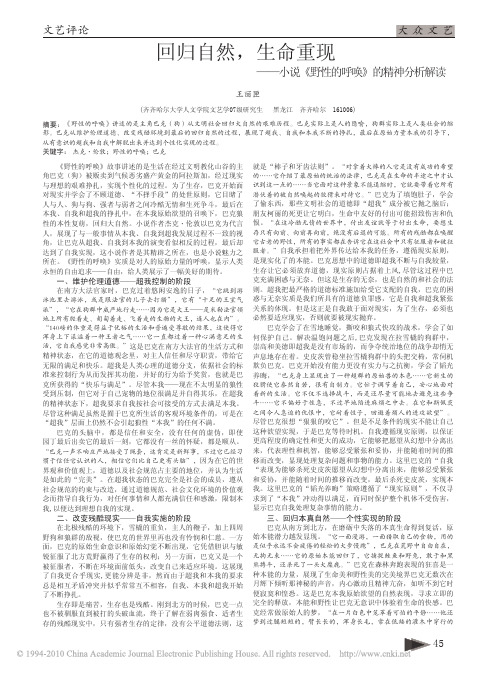
大 众 文 艺45《野性的呼唤》故事讲述的是生活在经过文明教化山谷的主角巴克(狗)被贩卖到气候恶劣盛产黄金的阿拉斯加,经过现实与理想的艰难挣扎,实现个性化的过程。
为了生存,巴克开始面对现实并学会了不顾道德、“不择手段”的处世原则,它目睹了人与人、狗与狗、强者与弱者之间冷酷无情和生死争斗,最后在本我、自我和超我的挣扎中,在本我原始欲望的召唤下,巴克狼性的本性复萌,回归大自然。
小说作者杰克·伦敦以巴克为代言人,展现了与一般事情从本我、自我到超我发展过程不一致的视角,让巴克从超我、自我到本我的演变看似相反的过程,最后却达到了自我实现,这小说作者是其精辟之所在,也是小说魅力之所在。
《野性的呼唤》实质是对人的原始力量的呼唤,显示人类永恒的自由追求——自由,给人类展示了一幅美好的期待。
一、维护伦理道德——超我控制的阶段在南方大法官家时,巴克过着悠闲安逸的日子,“它跳到游泳池里去游泳,或是跟法官的儿子去打猎”,它有“十足的王室气派”,“它在狗群中威严地行走……因为它是大王——是米勒法官领地上所有爬着走、匍匐着走、飞着走的生物的大王,连人也在内”。
“140磅的体重是得益于优裕的生活和普遍受尊敬的结果,这使得它浑身上下漾溢着一种王者之气……它一直都过着一种心满意足的生活,它自我感觉非常高傲。
”这是巴克在南方大法官的生活方式和精神状态,在它的道德观念里,对主人信任和尽守职责,带给它无限的满足和快乐。
超我是人类心理的道德分支,依据社会的标准来控制行为从而发挥其功能,并好的行为给予奖赏,也就是巴克所获得的“快乐与满足”。
尽管本我——现在不太明显的狼性受到压制,但它对于自己宠物的地位很满足并自得其乐,在超我的精神状态下,超我要求自我按社会可接受的方式去满足本我。
尽管这种满足虽然是囿于巴克所生活的客观环境条件的,可是在“超我”层面上仍然不会引起狼性“本我”的任何不满。
巴克的头脑中,都是信任和安全,没有任何的虚伪,即使园丁最后出卖它的最后一刻,它都没有一丝的怀疑,都是顺从。
野性的呼唤毕业论文
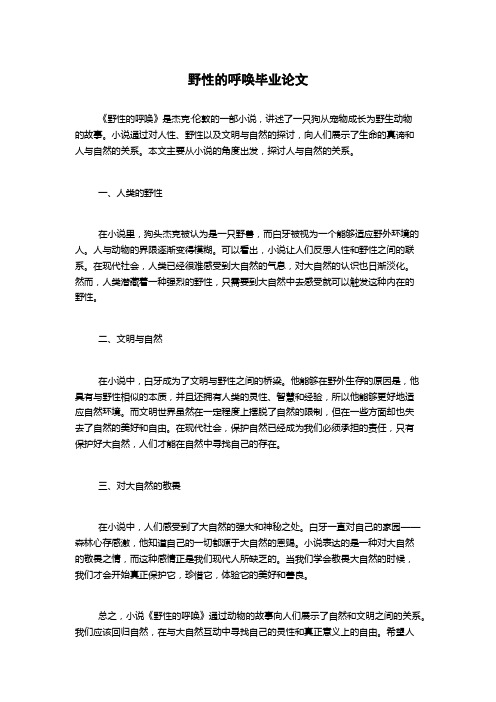
野性的呼唤毕业论文《野性的呼唤》是杰克·伦敦的一部小说,讲述了一只狗从宠物成长为野生动物的故事。
小说通过对人性、野性以及文明与自然的探讨,向人们展示了生命的真谛和人与自然的关系。
本文主要从小说的角度出发,探讨人与自然的关系。
一、人类的野性在小说里,狗头杰克被认为是一只野兽,而白牙被视为一个能够适应野外环境的人。
人与动物的界限逐渐变得模糊。
可以看出,小说让人们反思人性和野性之间的联系。
在现代社会,人类已经很难感受到大自然的气息,对大自然的认识也日渐淡化。
然而,人类潜藏着一种强烈的野性,只需要到大自然中去感受就可以触发这种内在的野性。
二、文明与自然在小说中,白牙成为了文明与野性之间的桥梁。
他能够在野外生存的原因是,他具有与野性相似的本质,并且还拥有人类的灵性、智慧和经验,所以他能够更好地适应自然环境。
而文明世界虽然在一定程度上摆脱了自然的限制,但在一些方面却也失去了自然的美好和自由。
在现代社会,保护自然已经成为我们必须承担的责任,只有保护好大自然,人们才能在自然中寻找自己的存在。
三、对大自然的敬畏在小说中,人们感受到了大自然的强大和神秘之处。
白牙一直对自己的家园——森林心存感激,他知道自己的一切都源于大自然的恩赐。
小说表达的是一种对大自然的敬畏之情,而这种感情正是我们现代人所缺乏的。
当我们学会敬畏大自然的时候,我们才会开始真正保护它,珍惜它,体验它的美好和善良。
总之,小说《野性的呼唤》通过动物的故事向人们展示了自然和文明之间的关系。
我们应该回归自然,在与大自然互动中寻找自己的灵性和真正意义上的自由。
希望人们能够从小说中汲取力量,爱护大自然,珍惜自然资源,用行动向大自然表达敬畏之情。
“三因素论”视域下野性的呼唤中巴克的成长与嬗变
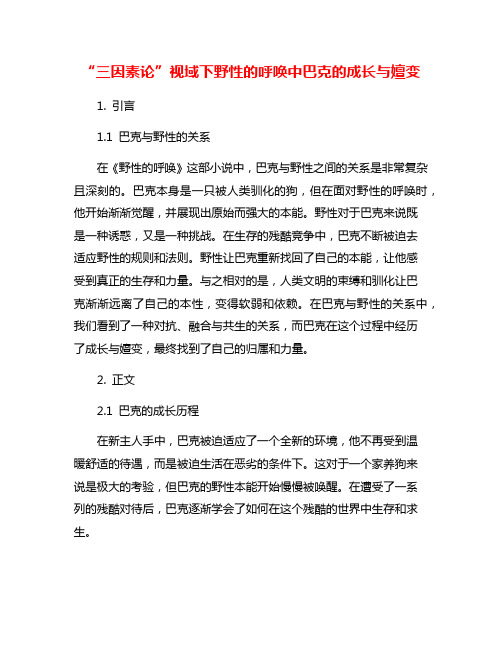
“三因素论”视域下野性的呼唤中巴克的成长与嬗变1. 引言1.1 巴克与野性的关系在《野性的呼唤》这部小说中,巴克与野性之间的关系是非常复杂且深刻的。
巴克本身是一只被人类驯化的狗,但在面对野性的呼唤时,他开始渐渐觉醒,并展现出原始而强大的本能。
野性对于巴克来说既是一种诱惑,又是一种挑战。
在生存的残酷竞争中,巴克不断被迫去适应野性的规则和法则。
野性让巴克重新找回了自己的本能,让他感受到真正的生存和力量。
与之相对的是,人类文明的束缚和驯化让巴克渐渐远离了自己的本性,变得软弱和依赖。
在巴克与野性的关系中,我们看到了一种对抗、融合与共生的关系,而巴克在这个过程中经历了成长与嬗变,最终找到了自己的归属和力量。
2. 正文2.1 巴克的成长历程在新主人手中,巴克被迫适应了一个全新的环境,他不再受到温暖舒适的待遇,而是被迫生活在恶劣的条件下。
这对于一个家养狗来说是极大的考验,但巴克的野性本能开始慢慢被唤醒。
在遭受了一系列的残酷对待后,巴克逐渐学会了如何在这个残酷的世界中生存和求生。
巴克的成长历程充满了挑战和困难,但正是这些经历锻炼了他的意志和勇气。
他不再是一个被宠坏的家养狗,而是变得强大、狡猾和机敏。
他学会了如何在恶劣的环境中谋求生存,并逐渐适应了野性的规则和法则。
巴克的成长历程是一个充满荆棘和艰辛的旅程,但正是这些挑战让他变得更加强大和坚韧。
他的成长故事在三因素论的视域下展现了一种独特的成长轨迹,揭示了野性的力量和影响。
2.2 三因素论对巴克成长的影响在《野性的呼唤》中,作者杰克·伦敦通过主人公巴克的成长历程,深刻揭示了“三因素论”对于个体成长的重要影响。
在巴克的成长过程中,三因素论中的遗传、环境和机遇都扮演着重要的角色。
遗传因素在巴克的成长中起着决定性作用。
巴克从出生开始就具有犬科动物的基因,具备狼的血统和野性本能。
这使他在面对艰难挑战时拥有强大的生存能力和适应性,从而使他在恶劣环境中生存下来。
环境因素也对巴克的成长产生深远影响。
从自然主义角度解读野性呼唤-精选文档

从自然主义角度解读野性呼唤1903年,杰克伦敦发表了小说《野性的呼唤》。
发表之后在业内引起了极大的反响,轰动空前绝后。
在此之后,我们的小说家都是一个落魄的淘金者。
小说《野性的呼唤》说的是一只名叫巴克的家养狗被赌徒盗卖到阿拉斯加后成为一只雪橇狗,劳动极为繁重,环境极其艰险。
狗队每天拉雪橇在雪地上行走40英里,而每只狗所得到的食物是根本吃不饱的一磅半鱼干。
因为食物跟不上,这些狗很快就被累垮,累垮之后,狗的主人就将其卖掉。
但是就是在这样极端的情况,我们的狗主角练就了一身吃苦耐劳的精神,相比于其他的狗,巴克更加机敏与勇猛,并且在最后在和斯佩茨争夺强者地位中取得胜利。
在巴克的内心中一直有着一股野性的力量呼唤着它,最终巴克回到了狼群中,更加直接地去面对生存的竞争,由于巴克的勇猛与机敏,最终也取得了在狼群中的统治地位。
一、《野性的呼唤》主题思想的自然主义文学倾向(一)达尔文的生物进化思想――优胜劣汰,适者生存在小说《野性的呼唤》中,巴克一直面对这来自恶劣的社会环境的威胁以及挑战。
杰克伦敦一直在提醒我们这是一个优胜劣汰,适者生存的时代,我们无时无刻不在接受这来着社会以及环境、他人的挑战与威胁。
在这样的情况下,我们只有竭尽全力去做一个强者,去适应在恶劣环境下的生存法则。
否则被无情自然法则淘汰的就是我们自身,就像小说里面一样,沦为别人的口中食。
巴克也用自己的实际行动不断地告诫我们,它是一个优胜劣汰环境中的一个强者,是能够在激烈的生存环境中生存下来的,它勇敢机智,灵敏,想尽一切办法,克服无数的艰难困苦,去残杀与斗争,避免它自己被淘汰与杀害,最终得以生存。
优胜劣汰,弱肉强食,适者生存,这是达尔文进化论中的重要观点,也是自然进步与社会发展的重要准则与必然结果。
在小说《野性的呼唤》中,因为受这条自然进化论的影响,我们可以看出其自然主义倾向,再现的真是生活我们也能看出作家杰克伦敦对人生的困惑与矛盾。
在野性力量的呼唤下,巴克显露出了其原始生存的野性,而不再是一只宠物狗。
野性回归----解读《野性的呼唤》中巴克本性的转变本科毕业论文(设计..
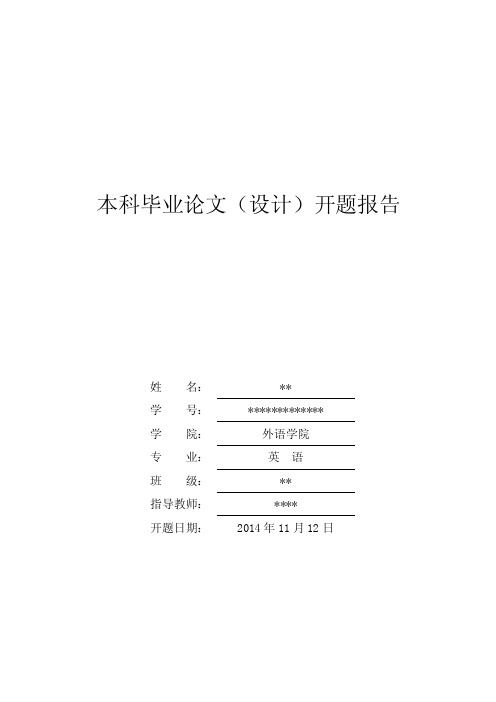
二、课题研究的主要内容:
(课题研究的重点和在研究过程中要解决的关键问题,所要实现预期成果)
Outline
1. Introduction 2. Literature review 3. An analysis on the changes of Buck’s nature
3.1 Buck’s nature in different stages 3.1.1 Human nature --- an arrogant pet and cunning rebel 3.1.2 Mixed nature --- working as a sled dog 3.1.3 Wild nature --- A brutal wolf leader
从开题报告的内容来看,作者思路清晰,重点突出,逻辑性较强,反映了作者 对该课题有了一定深如细致的研究,已具备了独立进行科研攻关的能力。
鉴于此,同意该生开题。希望作者广泛收集参考资料,一定要佐证详实,阐述 分析要做到有理有据。并且,在写作过程中要注意在借鉴前人观点的基础上,有自 己的独到见解。
六、所在系审查意见:
现实意义:
在《野性的呼唤》中作者将自己的思想赋予主人公巴克进而表达小说的主题。本 文通过对主人公巴克的蜕变历程、回归野性、最终得到自由的描写,不仅揭示了作 者的渴望:激发受压迫同胞的反抗精神,警告当权者黑暗的统治总有一天会垮台, 而且也会引发我们对现代社会的思考,那就是作者对自由、真我的“呼唤”仍然存 在于当今社会,而这种呼唤更倾向于是对“和谐、平等”的呼唤。
本科毕业论文(设计)开题报告
姓 名: 学 号: 学 院: 专 业: 班 级: 指导教师: 开题日期:
** *************
外语学院 英语
(英语毕业论文)野性的回归--试析《野性的呼唤》中巴克的生存斗争
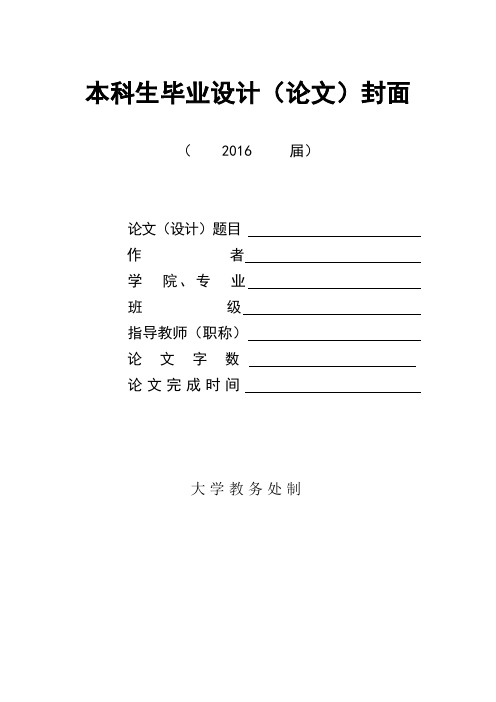
本科生毕业设计(论文)封面( 2016 届)论文(设计)题目作者学院、专业班级指导教师(职称)论文字数论文完成时间大学教务处制英语原创毕业论文参考选题(200个)一、论文说明本写作团队致力于英语毕业论文写作与辅导服务,精通前沿理论研究、仿真编程、数据图表制作,专业本科论文3000起,具体可以联系qq958035640。
下列所写题目均可写作。
部分题目已经写好原创。
二、原创论文参考题目1 浅谈体态语在小学英语教学中的作用2 中西方大学中第二课堂的角色研究3 浅析哈代主要小说作品中鸟的意象4 模糊语在商务英语谈判中的语用研究5 莎士比亚戏剧《哈姆雷特》中男主人公性格分析6 英语广告语中隐喻的研究7 On Dreiser’s View of Womanhood in Sister Carrie8 浅析《汤姆叔叔的小屋》中黑奴的命运9 A Research on V ocabulary Learning Strategies Employed by Non-English Majors in the CALL Environment10 由《红楼梦》中人名的英译看中西文化差异11 经贸英语中的缩略语现象及其应用12 试析《儿子与情人》中保罗畸形的爱情观13 中式菜肴名称英译的功能观14 为什么穷人会愤怒15 违反合作原则所表达的会话含义—以《越狱》中Theodore Bagwell话语为例16 零售创新典范及其对中国零售业的启示17 《警察与赞美诗》与《二十年后》中的警察形象比较分析18 中西方节日文化差异研究19 中式菜名的英译20 《名利场》和《嘉莉妹妹》女主角形象对比21 如何在高中英语教学中培养学生的创新思维能力22 功能目的论视角下的企业外宣资料的英译研究23 英汉“悲”、“喜”情感隐喻的认知比较研究24 论商业美学指导下的英文电影片名翻译25 中英道歉语及应答差异26 《双城记》中的象征手法分析27 论象征手法在《了不起的盖茨比》中的运用28 译前准备对交替传译成效的课堂研究——以礼仪祝辞类口译为例29 论跨文化因素在跨国企业管理中的影响作用30 A Comparative Study Between the Novel To Kill A Mockingbird and Its Film Adaptation31 An Analysis of Trademark Translation——from the perspective of Skopos Theory32 从中英语言中的幽默表达看中西方思维差异33 中西文化差异在家庭教育中的体现34 世纪年代的摇滚乐对美国传统价值观的影响研究35 狄更斯在《双城记》中的人道主义思想36 简析《卡斯特桥市长》中亨查德的悲剧命运37 模糊限制语在英语广告语中的使用及其语用功能探讨38 八十年代以来汉语中英语外来语及翻译39 从生态女性主义视角分析艾丽丝门罗《逃离》中女性人物命运40 作为成长小说的《远大前程》分析41 对比研究中西文化中的委婉语42 从《夜莺与玫瑰》看王尔德唯美主义的道德观43 浅谈简奥斯丁《劝导》的反讽艺术44 克林顿总统就职演说之体裁分析45 儿童本位主义在儿童文学翻译中的应用—《哈克贝利费恩历险记》两种译本的对比分析46 从接受理论的角度看儿童文学的翻译--以《爱丽丝梦游仙境》为例47 论电影翻译中的创造性叛逆——以《肖申克的救赎》为例48 浅析文化差异对中西商务谈判的影响49 中西面子观比较研究5051 论《德伯家苔丝》中安吉尔行为的合理性52 A Lonely but Strong-willed Soul A Character Analysis of Ellen Weatherall in The Jilting of Granny Weatherall53 浅析MSN交谈中的话语标记语54 关联理论视角下幽默的英汉翻译55 从《在路上》解读“垮掉的一代”时代背景与主题56 情感在英语教学中的作用及其实施57 The Problems in English and Chinese Trademark Translation and Relevant Countermeasures58 英语习语陷阱及其学习策略59 广告语中预设触发语的语用分析60 对《呼啸山庄》中希斯克里夫性格转变的分析61 《儿子与情人》恋母情结分析62 论《瓦尔登湖》中梭罗的超验主义哲学观63 艾丽丝沃克《日用家当》中的人物解读64 中英称谓语的文化差异及其翻译65 分析内战对《飘》中斯佳丽的影响66 浅谈汉数字习语英译中的虚化现象67 从中美商务谈判语言看中美文化差异68 由英语外来词谈中英文化69 论《最后的莫西干人》中的印第安情结70 跨文化意识在初中英语教材中的渗透71 汉英颜色词语的内涵语义浅析72 A Brave Call for Peace--An Analysis of the Relationship between Frederic Henry and Catherine Barkley and Its Tragic Ending in A Farewell to Arms73 边缘人的挣扎——浅析《断背山》之恩尼斯74 浅析《了不起的盖茨比》中的象征75 合作学习理论在中学英语课堂中的应用76 从目的论角度分析产品说明书的翻译77 童话世界里的诗意与纯美—赏析奥斯卡王尔德的《夜莺与玫瑰》78 乡村音乐歌词的人际意义分析79 颜色词的中英对比翻译80 浅谈中外记者招待会中口译者的跨文化意识81 中西幽默异同探析82 宗教对英汉语言的影响83 Cultural Differences Between English and Chinese by Analyzing Brand Names84 许渊冲的诗歌翻译理论与实践85 汉民族节日名称英译中的文化价值取向研究86 《金色笔记》与多丽丝莱辛的女性主义思想87 初中英语词汇教学法研究综述88 Humor as Perceived from the Cooperative Principle89 论商标名称的翻译对品牌形象的影响90 A Comparison of the English Color Terms91 从民族文化心理差异角度看功能对等论在商标翻译中的运用92 广告英语的特点及其翻译探索93 广告英语标题翻译的修辞特点94 On Translation of Humorous Language from English to Chinese95 The Application of TBLT in English Reading Classes of Junior High School96 瓦尔登湖畔的隐士:反抗与变革97 中西文化差异对商务礼仪的影响及对策98 Bertha Is Jane:A Psychological Analysis of Charlotte Bronte’s Jane Eyre99 汉语叠词翻译的对等研究100 论接受理论对儿童文学作品的影响——以《快乐王子》中译本为例101102 中餐菜单英译的归化与异化103 东西方人名文化与翻译—以英汉人名为例104 从合作原则看卡尔登的性格特点105 从小说人物分析简奥斯汀的情感智慧106 《哈姆雷特》对白翻译的语用分析107 自我效能感对大学生英语学习的影响108 分析《了不起的盖茨比》中美国梦的二元性109 On the Image of Women's Language in English110 电视公益广告的多模态话语分析111 A Comparison of the English Color Terms112 语境对词汇语义的语用制约113 从奥运菜单看中式菜肴英译名规范化程度114 英语词汇的记忆方法115 A Comparison of the Dragon Culture in the East and the Sheep Culture in the West 116 寻找女性的自我—评托妮莫里森作品《秀拉》中秀拉形象117 认知角度下的隐喻翻译118 The French Revolution in the Novel A Tale of Two Cities119 浅析隐藏在“面纱”之后的伯莎梅森120 《爱玛》中的女权思想解读121 英语新闻标题的前景化122 女性主义角度解读《董贝父子》中伊迪丝的堕落女性形象123 《布罗迪小姐的青春》中的人物冲突分析124 英语体育新闻标题的特点及其翻译125 试析《我知道笼中鸟为何歌唱》的成长主题126 从精神家园的追寻与构建的角度来解读梭罗与《瓦尔登湖》的思想127 西方骑士精神与中国侠义精神的比较研究—以《亚瑟王之死》和《水浒传》为例128 对美国总统就职演说的文体分析129 《麦田里的守望者》男主人公霍尔顿的人物形象分析130 A Survey of the M anifestations of “Babel” in the Movie Babel131 An Analysis of Huckleberry Finn’s Personality132 英语委婉语中的转喻现象分析133 从《看不见的人》中看黑人对自我身份的追求和探寻134 功能对等视角下记者招待会古诗词翻译策略研究135 课本剧在高中英语教学中的应用与研究136 对《汤姆叔叔的小屋》中人物的圣经原型解读137 英语专业听力课程教学效率的调查与分析138 从《篡夺》中看辛西娅奥兹克作品中的反偶像崇拜精神139 从功能对等的角度论英语习语翻译140 汉英“龙”文化浅析141 剖析希腊神话中的爱情观142 论《爱玛》中简奥斯丁的社会理想143 外国商标的中文翻译策略及其产品营销效应研究144 中美饮食文化的差异145 女权主义评论视角下的《金色笔记本》146 尼斯湖和西湖—中西方旅游性格差异研究147 从《京华烟云》探析林语堂的女性观148 论《简爱》中的女性意识149 A Comparison of the English Color Terms150 从接受美学浅谈英文电影片名的汉译151 Application of Cooperative Learning to English Reading Instruction in Middle School 152 《永别了,武器》中的自然象征意义153 《玻璃动物园》中的逃避主义解读154 英汉歌词衔接手段的对比及翻译155 礼貌原则在国际商务信函中的运用156 英语教育产业化对英语教育的影响157 广告翻译中的语用失误研究158 汉语语速性别对比研究159 亨利詹姆斯的《戴茜米勒》中的文化冲突和文化融合160 中英文化差异与翻译策略161 浅析短篇小说《我不再爱你》的荒诞性162 从《永别了,武器》试析海明威心目中的理想女性163 新闻新词的文化内涵与翻译164 夏洛克悲剧性原因探究165 道林格雷——《道林格雷的画像》中华丽外表下的丑恶心灵166 浅析国际商务谈判文化因素及其对策167 汤姆叔叔的小屋中汤姆形象分析168 合作原则在《红楼梦》习语英译中的应用169 论《最蓝的眼睛》中女主人公佩克拉的家庭关系170 英国喜剧电影和美国喜剧电影的不同特点分析171 英汉汽车广告中常用“滑溜词”的对比分析172 中美文化差异对其商务谈判的影响173 《欲望号街车》中布兰奇的悲剧成因分析174 从电影《刮痧》看东西方文化差异175 动之以情,晓之以理---浅析语法情景教学在中学英语课堂中的设计与运用176 论简爱的性格特征177 从女性主义分析《红字》与《傲慢与偏见》178 《玻璃动物园》中的逃避主义解读179 企业资料的翻译原则180 对《推销员之死》的价值探讨181 浅析《德伯维尔家的苔丝》中造成苔丝悲剧的因素182 分析《老人与海》主人公圣地亚哥的人物形象183 The Features of Classic-literature-based Movies Showed in Pride and Prejudice184 《麦田里的守望者》中霍尔顿的成长三部曲185 浅析隐藏在“面纱”之后的伯莎梅森186 论《喜福会》中母女关系背后的文化冲突187 影响英语专业学生理解英语习语的因素调查188 A Brief Analysis of the Auspicious Culture in the Wedding Custom Between China and Western Countries189 英语新闻标题的语言特点及翻译190 《本杰明富兰克林自传》和《嘉莉妹妹》美国梦的对比研究191 《红字》中的冲突192 对《德伯家的苔丝》苔丝的悲剧分析193 英语习语学习策略的探究194 《西风颂》两个汉译版本的文体分析195 动机理论在英语教学中的应用196 走出迷茫,寻回丢失的信念——富兰克林给毕业者的条忠告197 On Michael Moore's Fahrenheit / From the Rhetoric Perspective 198 A Comparison of the English Color Terms199 小说《嘉莉妹妹》中女性成长的分析200 《沉默的羔羊》三部曲中汉尼拔博士性格探析。
“三因素论”视域下野性的呼唤中巴克的成长与嬗变
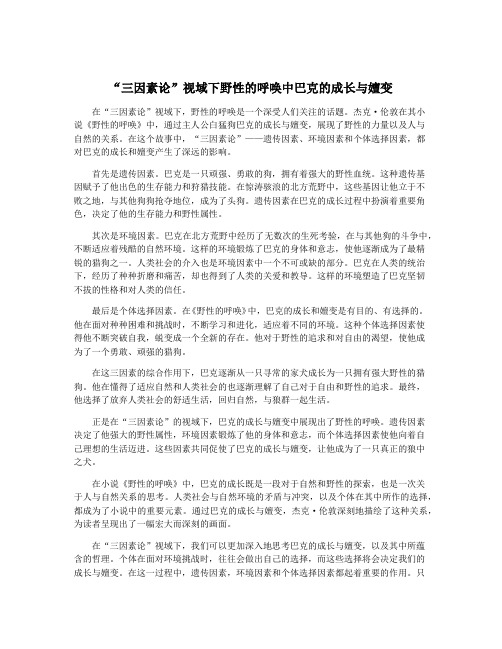
“三因素论”视域下野性的呼唤中巴克的成长与嬗变在“三因素论”视域下,野性的呼唤是一个深受人们关注的话题。
杰克·伦敦在其小说《野性的呼唤》中,通过主人公白猛狗巴克的成长与嬗变,展现了野性的力量以及人与自然的关系。
在这个故事中,“三因素论”——遗传因素、环境因素和个体选择因素,都对巴克的成长和嬗变产生了深远的影响。
首先是遗传因素。
巴克是一只顽强、勇敢的狗,拥有着强大的野性血统。
这种遗传基因赋予了他出色的生存能力和狩猎技能。
在惊涛骇浪的北方荒野中,这些基因让他立于不败之地,与其他狗狗抢夺地位,成为了头狗。
遗传因素在巴克的成长过程中扮演着重要角色,决定了他的生存能力和野性属性。
其次是环境因素。
巴克在北方荒野中经历了无数次的生死考验,在与其他狗的斗争中,不断适应着残酷的自然环境。
这样的环境锻炼了巴克的身体和意志,使他逐渐成为了最精锐的猎狗之一。
人类社会的介入也是环境因素中一个不可或缺的部分。
巴克在人类的统治下,经历了种种折磨和痛苦,却也得到了人类的关爱和教导。
这样的环境塑造了巴克坚韧不拔的性格和对人类的信任。
最后是个体选择因素。
在《野性的呼唤》中,巴克的成长和嬗变是有目的、有选择的。
他在面对种种困难和挑战时,不断学习和进化,适应着不同的环境。
这种个体选择因素使得他不断突破自我,蜕变成一个全新的存在。
他对于野性的追求和对自由的渴望,使他成为了一个勇敢、顽强的猎狗。
在这三因素的综合作用下,巴克逐渐从一只寻常的家犬成长为一只拥有强大野性的猎狗。
他在懂得了适应自然和人类社会的也逐渐理解了自己对于自由和野性的追求。
最终,他选择了放弃人类社会的舒适生活,回归自然,与狼群一起生活。
正是在“三因素论”的视域下,巴克的成长与嬗变中展现出了野性的呼唤。
遗传因素决定了他强大的野性属性,环境因素锻炼了他的身体和意志,而个体选择因素使他向着自己理想的生活迈进。
这些因素共同促使了巴克的成长与嬗变,让他成为了一只真正的狼中之犬。
浅析《野性的呼唤》中的巴克

浅析《野性的呼唤》中的巴克摘要:《野性的呼唤》的主人公巴克以其异常坚韧的生命姿态跃然于杰克伦敦笔下,艺术性的创造了赋予人性的的巴克。
作者通过动物的视角来反观人类, 是对人性的现实写照和理性审视。
在巴克身上,不仅可以看到作者的身影,也可以看到作者的渴望和追求。
可以说,巴克是杰克·伦敦生活的真实反映关键词:巴克多重性格杰克伦敦现实写照《野性的呼唤》是杰克·伦敦最有名的动物小说之一。
可以说,他在世界文坛的地位与成就,很大程度上得益于以《野性的呼唤》为代表的动物小说。
小说叙述了一只名叫巴克的狗,从南方一个法官家庭被偷卖到冰天雪地气候恶劣的阿拉斯加做雪橇狗,不断适应逐渐变强,最后回归自然,成为一只领头狼的故事。
小说虽是写狗,实则写人,虽写的是动物社会,实则影射人类社会。
仔细对比就会发现,巴克和伦敦本人在很多方面都有着惊人的相似,巴克的经历折射了伦敦自己的经历,巴克的渴望也反映着伦敦的渴望。
可以说,巴克在一定程度上就是伦敦自己,是伦敦的现实和理想自我的结合。
一、巴克的多重性格分析( 一) 富有抗争精神的强者巴克一生下来就住在加利福尼亚米勒法官的庄园中, 过着优越的贵族生活。
但是后来遭人拐卖, 从舒适的南方被抛到严酷的北方, 生命和肉体随时都处在危险之中 。
面对残酷的生存环境, 巴克没有向命运低头。
当它被卖给狗贩子后, 勃然大怒,一次又一次地反扑, 直至被打得失去知觉。
后来, 巴克把领头犬斯匹茨击败, 它想当领头犬, 主人却让索尔利克站在领头犬的位置上, 巴克非常生气, 坚决不妥协,它们较量了一个多钟头, 最后, 弗朗索斯, 巴克的主人不得不扔下棍棒, 表示失败, 而巴克则带着胜利者的微笑站在领头犬的位置。
还有一次, 巴克给查尔斯、哈尔一伙拉雪橇, 当走到约翰 桑顿营帐的时候, 桑顿忠告哈尔不要继续前进, 河道开始融化了,很危险。
哈尔不听劝阻, 一意孤行, 挥舞皮鞭, 指挥狗队继续前进。
整个瘫在地上的狗队, 在哈尔皮鞭的无情抽打下, 挣扎着痛苦地爬了起来。
- 1、下载文档前请自行甄别文档内容的完整性,平台不提供额外的编辑、内容补充、找答案等附加服务。
- 2、"仅部分预览"的文档,不可在线预览部分如存在完整性等问题,可反馈申请退款(可完整预览的文档不适用该条件!)。
- 3、如文档侵犯您的权益,请联系客服反馈,我们会尽快为您处理(人工客服工作时间:9:00-18:30)。
【标题】分析《野性的呼唤》中巴克回归自然的原因【作者】文程娟【关键词】回归;原因;冷酷;追求与向往【指导老师】吴学容【专业】英语【正文】I. IntroductionThe Call of the Wild, written by Jack London, was a very famous work in literature field. American writer, Jack London, was very good at describing things and society in the shoes of animals, that is, in personification. So does this work. In this novel, the story happened in the process of gold rush where people need be nefit themselves on the basis of other’s loss or sufferings. Dog protagonist, Buck, was living in this circumstance. He experienced both the warmth and the coldness of human society. Jack London used the style of personification to describe the nature of human and the world in dog’s eye which can full reveal the coldness and cruelty of the Capitalist Society. There are many reasons, both in subjective and objective that led the return of Buck to the wild. Many scholars in domestic have made some studies of this work which were meaningful. It not only can help us learn some society and literary knowledge but also understand this classic work clearly and deeply.Buck’s return to the wild was not caused by one reason but many. The subjective ones were the characteristics of Buck himself which were hidden in human warmth and revealed in the struggles to survive. The main objective reason was the fact of Struggle for Existence that no one can escape, and other reasons included the coldness and cruelty of human society and the call of the wild. Buck’s life in this cruel and cold circumstance decided that his return to the wild was not occasional but inevitable. However, the author, Jack London, also made some drama effects. The experiences of Buck in human society were not the only purpose for Jack London to write this story, but to criticize the darkness of the Capitalist Society and reflect his wish, that is, the desire of freedom and dream.There will be five main reasons analyzed in this essay, including the characteristics of Buck; the brutal principle of Struggle for Existence; people’ behaviors in the process of gold rush; the call of the wild and the drama effect made by Jack London.Ⅱ. Literature ReviewA. The Background of the author—Jack LondonJack London was a famous and productive American realistic writer who lived in 20th century with rich but hard experiences in all his life. He came from lower class with a suffering childhood and had a better understanding of the life of poor people. Because of his poor birth and background, Jack London tried many ways to get rid of the poor situation. Such as, went outside to do part-time job; to be sailor and joined the troop of gold rush. Unfortunately, these tries didn’t change the suffering situation. But he didn’t lose the interest in reading. Books companied him during all his hard life. Those hard experiences enriched his knowledge which made contribution to his later writing work. He began his writing career after his failure of gold rush in Alaska. His works were full of strength and strong revealing. The work, the Call of the Wild, was one of his most famous animal novels, in which the gold rush life filled with dangers and struggles of dogs in this special circumstance were deeply described.Jack London left more than 50 pieces of works in his 16 years’ writing career. After being well-known, he indulged in the pleasure of materials. At last, he committed suicide because of the emptiness and disappointment in his mental world.B. The Story of the Call of the WildThe story mainly talked about the process of dog protagonist, Buck’s return from human civilization to primitive wild living with the wolves. Buck was a very strong wolf dog with 140 pounds in weight. He could have lived a comfortable life in a Judge’s place. Unluckily, he was stolen to sell by Judge’s gardener. He was first sold to the Post Office then two French Canadian. These dogs were not only abused by brutal human, but also had to fight and kill with each other for survival. Because of the powerfulness both in physical and mind, Buck won the former leader to be the new leader in the sledding team after a serious fight. Buck had been sold several times in his life with human. Finally he was adopted by John Thornton just when he was beaten nearly to death. Buck recovered quickly under the careful treatment of John Thornton and they made friends with each other. Buck was extremely faithful to his new master. He had ever saved John Thornton twice from dangers. Unfortunately, John Thornton was killed in the process of gold rush. Buck was very angry and bit several Indians to death to take his master’s revenge. He had no affection for human society any more after the death of his master. Meanwhile, there was always a call in forest attracting him. Finally, he obeyed the call and returned to the wild living with wolves. However, he didn’t forget John Thornton but mourn for his master regularly.Ⅲ. The Subjective Reason of Buck’s Return—the Characteristics of Buck Buck had the characteristics of wolf all the time. His wild nature was only hidden in human’s society but not disappeared. When he lived in the sledding team and suffered disastrous experience, it’s no doubt that his wild nature will be revived one day, and lead his return to the wild at last. Buck’s birth made him has the characteristics of wolves. Buck was ahalf-breed whose father was a huge St. Bernard dog and mother a Scotch shepherd dog. Therefore, He grew up with a strong body of St. Bernard dog and cunning of shepherd dog. He learned to fight with cut; slash and quick wolf snap easily when he went hunting with his master in his earlier life, for this was also the manners of his ancestors. When chasing a snowshoe rabbit, he wanted to run the wild thing down and killed it with his teeth and fel t a sense of joy to kill. Buck’s instincts of wolf had never disappeared but been hidden by comfortable life in human society. The sledding life made his old instincts revived gradually. He was clever and cunning. The fight with Spitz, the leader dog of the team, was evidence. When he thought the time was not advantageous for him to beat Spitz down , he avoided conflicting with Spitz directly but thought of many ways against Spitz, such as interference between Spitz and culprits in the absence of his master; rebellion in secret. After the death of Spitz, he thought he would be the leader dog. When his master didn’t do what he thought of, he refused to sled in the condition that he must be in the leader position. His master had no method but obeyed him. Meanwhile, he adapted the environment quickly. For example, after experiencing the sorrow of being beaten by club, he realized that the struggle and revolt were in vain when meeting with club. So he would be a good dog in this situation. In the life of sledding, he even gave up the fastidious habits and ate disgust food to make himself strong after being aware of the true reality; he also learned how to find a comfortable place to sleep and how to steal food without being suspected and caught. In fact, all his nature was kept in his mind even though he lived with human. The life and experiences in the sledding team just created a condition for his nature’s revival.The call in Buck’s inner world was another factor of his wild revival and return. Although he loved John Thornton deeply, the primitive instincts still remained alive and active. He was faithful and devoted, but he still retained his wildness and wiliness for he was a thing of the wild. He would not steal John Thornton’s things but others without being suspected. The best thing Buck loved to do was to lie beside the fire. However, he would not think of the comfortable life in Judge’s place for it was far away from him and had no influence on him anymore. The most powerful thing was the memories of his heredity that could give things he had never seen before a seeming familiarity which in fact were the memories of his ancestors. And these memories were revived in his body in later days. Actually, he kept the nature in mind and desired returning to wild. But it was just the love for John Thornton that kept him in human society.Sometimes he did things without realization. Every time he heard the yelps in forest, he couldn’t help turning his back upon the fire and the beaten earth around it and plunging into the forest and ran and ran. He didn’t know where or why; nor did he wonder where or why. When he chased a snowshoe rabbit, he only wanted to kill it with his sharp teeth, but he still didn’tknow why he wanted to do it like this. Buck also had a patience of the wild, which was expressed when he hunted living food. Buck showed this patience when he clung to the flank of the herd. He didn’t kill the target one at once but shadow the group and separated it from their group for his power was not enough against a group. At last he pulled the great moose down after four days’ shadow and ate it in a primitive way full of wild joy. He did this in the ways of wolves and enjoyed the victory. All of these happened from Buck’s instincts even he himself didn’t realize i t.Ⅳ. The Objective Reasons of Buck’s Return to the WildExcept for the subjective reason of Buck’s return to the wild which was caused by Buck’s characteristics, there are also objective reasons, including the brutal principle of Struggle for Existence; the coldness of people’s behaviors in the process of gold rush; the call of the wild and the drama effect. All of them are helpful to the revival of Buck’s wild nature. They are very important leading the return of Buck to the wild.A. The Brutal Principle of Struggle for ExistenceNatural principles were disciplines that nobody can violate. When facing them, people can do nothing but obey them and do things regularly. The evolution of living creatures was also the product of natural principles.1. The Int roduction of Darwin’s Theory of Struggle for Existence and Natural SelectionDarwin was a very famous British biologist who wrote a book called the Origin of Species. In the book he proposed the principles of Struggle for Existence and Natural Selection.Struggle for Existence—According to Darwin, every species will have relations with its surroundings in the life process, and every life will compete and fight with others for existence, for the surroundings will influence its life and descendants. So the species must fight with the circumstance around him. 1Natural Selection—There always exists struggles among living things. The fittest will survive and the unfittest will be eliminated. The species inherits and evolutes in this way.2 This is so-called Natural Selection. The Darwin’s theory has made a great contribution to species’ evolution.2. The Cruel Survival Rules Which Leads the Revival of Buck’s Wild Nature Just like what Wang Changrong, a Chinese scholar, said in his work, the History of American Mo dern Novels, the determined factors of Buck’s moderate characteristics in human society and his return to the wild at the end are the environment and condition.3 Actually, Darwin’s theory of Struggle for Existence and Natural Selection were completely expressed in Buck’s life. His strong, cunning and treacherous nature was gradually showed in order to survive.Actually, Buck was also the product of natural principles. He lived and behaved with natural disciplines. Since he wanted to survive in the sledding team, he had to learn something cunning and treacherous to remain hisposition. In the process of being sold to be a sledding dog, Buck wanted to give these hated people a lesson to show his anger. Unfortunately, he got a lesson himself. He was beaten by a strong club seriously. The more excitedly he revolted, the heavily the club beat. This was a turning point of Buck’s awareness. He realized that this was a brutal world; a man with a club was a lawgiver, and a master to be obeyed. 4 So he learned to be a good dog to satisfy his master.The fate of Curly, one of Buck’s partners, who made advances to a husky dog in her friendly way but finally be tumbled and nibbled by a group of dogs let Buck knew that this was a world that the strong would exist but the weak be eliminated. The only way to survive in this world was to be strong and never be beaten down instead of enduring only.Therefore he tried his best to learn the rules to survive. He learned how to sleep comfortable in snowfield; how to fight and steal things without being caught. He even lost his fastidiousness about food to make himself stronger. Learning how to steal things symbolized the degeneration and collapse of Buck’s morality cultivated in human civilization society; for he knew that the morality in this serious circumstance was an obstacle, being stronger and cunning were the most important thing. He got this lesson by an experience that his food was stolen. In order to live in this sledding team, he must win Spitz to be the leader, or he would always be oppressed by Spitz. He waited his time with patience and avoided conflicting with Spitz directly. But he would think of many ways against Spitz. When the time was proper, he tried his best to kill Spitz and to be the leader dog. All of these m ade contributions to the revival of Buck’s primitive nature.B. The Behaviors of People in the Process of Gold RushAfter the death of John Thornton, Buck had no affection for human society and chose to return to the wild. The exterior reason was the attitude of human towards him. In the process of gold rush, people’s behaviors were so selfish, cold and cruel that Buck thought it’s not meaningful to remain there anymore. To some extent, people’s behaviors at that time were a direct reason causing the return of Buck.1. The Cruelty and Coldness of PeopleBy the end of 19th century, Capitalism in America had developed rapidly. Capital was controlled by some capitalists, which then caused monopoly capital. The society was divided into several classes and the contradiction was very serious among these classes. The labors struggled at the range of death. One of the serious effects of classes division was the collapse in moral. In such a society that money and position ranked the highest, people’s pursuit of both o f them was terrifying. They could do whatever evil thing to achieve their goals in order to survive which was no difference from that in primitive society. When the gold rush prevailed, many people joined this wealthy group. In order to get utmost benefits, people would not care about others. The human became more and more selfish and colder.2. Buck’s Sufferings in Human SocietyThe cruelty and coldness of human to the most extent led Buck’s decision between human society and the wild. First was the treac hery of the Judge’s gardener who sold Buck. He sold Buck just because he indulged in gambling and needed money. Then came the stout man with a red sweater. He was colder and more brutal. He was good at training dogs and didn’t fear any of them. He beat Buck nearly to death every time Buck revolted and taught Buck a lesson that he must obey the man with a club. Buck did learn a lesson of the coldness of human from his treatment. Last were the three green-hand masters who didn’t know how to manage a sledding team. They did treat these sledding dogs well at the beginning. But when the dog food was in shortage and the plan couldn’t go on as planned. They lost patience and always quarreled with each other. Then they reduced the food for dogs but required to run the same miles which always made these sledding dogs extremely tired not only because of little food but little rest. The dogs were tired to death one by one. They didn’t care about but bought other dogs. Under the management of these people, Buck also lost his earlier enthusiasm. He suffered the sorrow, too. All of his stiffness and gloss had gone out of his beautiful furry coat. The hair hung down, limp and draggled, or matted with dried blood where Hal’s club had bruised him. His muscles had wasted away to knotty strings, and the fresh pads had disappeared, so that each rib and every bone in his frame were outlined cleanly through the loose hide that was wrinkled in folds of emptiness. It was heartbreaking.5 When Buck fell down because of tire and couldn’t climb up, his master, Hal, exchanged his whip for a club to beat Buck brutally. Buck was full of despair. He even didn’t do any struggle but waited to die. At last he was saved by John Thornton, a very kind man. But the fate of other dogs was not as lucky as that of Buck. Hal gave up getting Buck back but forced other dogs to go on the miles. All of them fell into the ice hole and disappeared when the ice broken.Buck had no love for human during the life in human society except for John Thornton, who saved Buck from death and treated Buck not as domestic animal but his own child. Buck loved him very much and could do everything for him. After the death of John Thornton, Buck had no affection for human any more for he had experienced the cruelty and coldness in this society. He responded the call and returned to the wild.C. The Call of the WildThe call of the wild mainly refers to the call from the forest which was an exterior influence on Buck. It influenced Buck indirectly. During Buck’s life in the sledding team, he always heard the call. The call reminded Buck of some of his instincts which were inherited from his ancestors. Meanwhile, because of this call, Buck found the direction of his end-result after leaving the human society.The call from the wol ves in the forest was an outside reason of Buck’sreturn. The call was distinct and definite as never before—a long—drawn howl, like, yet unlike, any noise made by husky, deep in the forest the call was sounding and as often as he heard this call, mysteriously thrilling and luring.6 Every time he chased the call to the unbroken earth, the love for John Thornton would drive him back. But he still yearned for the call. The call had greatly influenced Buck day and night. Once a time, Buck met one wolf and made friends with it. Buck’s old memories were appeared in his mind. He followed the wolf who wanted to lead Buck to a place where they could run freely in the open yard with unpacked earth underfoot and wide sky overhead. Buck was wildly glad. But it was just the love of John Thornton made him turned back. Finally, John Thornton was dead. The last tie with human society was broken. Buck heard the yelps again, as the yelps grew closer and louder, Buck knew them as things heard in that other world which persisted in his memory. It sounded more luring and more compelling than ever before.7 At this time, Buck decided to obey the call.D. Drama Effects—Jack London’s Pursuit of Freedom and DreamJack London came from the lower class of Capitalist Society. He pitched his desire and wishes in the characters in his literature works, which was always a method used by most writers to express feelings. In this novel, Jack London described the society in dog’s eye vividly in personification. Buck’s desire and return to free dom were actually the expression of Jack London’s pursuit of freedom and dream. The world of these dogs is the world of Capitalist Society in which Jack London lived. The fight and struggle of dogs reflected the lives of poor people in this society. Jack London used Buck’s experiences and desire to show his own wishes.At the same time, Jack London engraved Buck as a dog full of faithfulness, enthusiasm and emotion. This can be seen from his life in Judge’s place and his faith to John Thornton. On the contrary, Jack London described the people in this society as cruel, cold and selfish. This formed a comparison between human and dogs which can give the reader a sense that even the dog was much friendlier than human beings. Meanwhile, it can give the Capitalist Society a warning that a deep reflection was needed.Ⅳ. ConclusionThe Call of the Wild described a dog’s survival and struggle in brutal circumstance in appearance. Actually it showed the hardness of people’s struggle to survive in a seriously competitive society. As Mao Xinde, a Chinese scholar, said in his work, the Outline of American Novels, Jack London used the writing style of satire and innuendo to expose the reality of American society at author’s time by stating the loss of morality and the se rious struggle among dogs. 8 Jack London didn’t talk about the story of a dog lived in human society and described his experiences purely, but reflected the society in an indirect way. Through analyzing the subjective and objective reasons of Buck’s return to the wild, we can easily understand the author’s purpose that is, stating the miserable life of the labors withthe experiences of dogs to reveal the darkness of the society and showing his good wishes for freedom.Notes1 方宗熙,《懂一点达尔文进化论》,北京:北京青年出版社,1977年,第53页。
